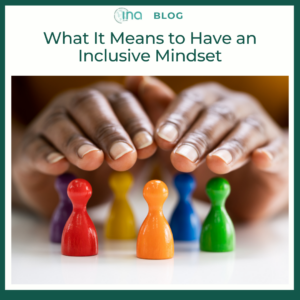 Creating an inclusive mindset takes some focus and, in some cases, a complete re-training of thinking. Being inclusive means bringing people into the circle and making sure they know that you value and appreciate their differences. It starts with communication – telling them that you care – but it should always be followed up with action. Not sure if you have an inclusive mindset? Here are some key traits.
Creating an inclusive mindset takes some focus and, in some cases, a complete re-training of thinking. Being inclusive means bringing people into the circle and making sure they know that you value and appreciate their differences. It starts with communication – telling them that you care – but it should always be followed up with action. Not sure if you have an inclusive mindset? Here are some key traits.
A willingness to develop greater emotional intelligence.
Someone with an inclusive mindset is emotionally intelligent, aware of the impact of their actions and words. To develop this skill, you must be self-aware enough to recognize that what you do and say could trigger or stir emotions in someone who is vulnerable about an issue. Be keenly aware of the emotions of others, as this helps develop empathy and greater inclusivity to recognize how others are feeling.
A commitment to be humble.
No matter how hard you try to be inclusive, you may end up making a mistake along the way. Be humble enough to recognize that you don’t know it all and that you are learning. Arrogance can cause close-mindedness, which is the opposite of an inclusive mindset.
A focus on staying curious.
Curious people are willing to learn about people, thoughts, or ideas that they are unfamiliar with. By staying curious, you stay open to understanding who people are, and what makes them unique and different. Over time, this fosters inclusivity and empathy.
A determination to push away perfectionism and judgment.
It is very easy to make snap judgments about people or situations. Unfortunately, making impulsive judgements will derail your goal of developing an inclusive mindset. If you show that you are judgmental or easily discourage people who share their thoughts, ideas, or parts of who they are, then they will shut down and ultimately won’t be willing to put themselves out there. The same goes with perfectionism. Try not to expect everyone, including yourself, to be perfect – this just leads to anxiety and stagnation, and ultimately creates a mindset that judges and holds people to standards they are incapable of achieving.
In the end, inclusivity is about welcoming others and giving them not just a seat at the table, but a voice, too. Making sure that you frame your thinking to include others rather than exclude them, is something that will not just benefit your professional life, but your personal life as well.
